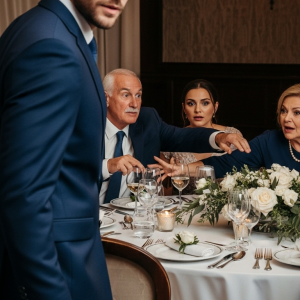My name is Rebecca Wilson, and at thirty-eight years old, I stood at my mother’s funeral, a quiet dread coiling in my stomach. It wasn’t just the grief, but the impending arrival of my sister, Stephanie. Six years. It had been six years since she had slipped away with Nathan, my millionaire fiancé, the man whose future I thought was my own.
When they finally walked in, the air in the funeral home seemed to shift. Stephanie, draped in a designer black dress, flashed her diamond ring with a practiced, smug smile. A wave of unexpected calm washed over me. She had come here armed for a battle that was already over. She had no idea who was waiting to meet her.
Before I tell you how my sister’s face turned white as a sheet when she saw the man I married, let me take you back.
My mother, Eleanor, was the glue of our family. Growing up in our modest suburban home, she taught me about strength and dignity. She was my confidant, my advisor, my biggest cheerleader. When stage four pancreatic cancer was diagnosed eight months ago, my world crumbled. She faced it with remarkable grace, more concerned about us than her own suffering. In her final weeks, she held my hand and made me promise to find peace in my life. A promise I was about to prove I had kept.
Six years earlier, my life had seemed perfect. I was a successful marketing executive, but my 60-hour weeks left little room for love. Then I met Nathan Reynolds at a charity gala. He was charismatic, a self-made tech millionaire with a confidence that filled any room. Our connection was immediate, a whirlwind of weekend trips to Martha’s Vineyard and intimate dinners overlooking the Boston harbor. Eighteen months later, on a private yacht, he proposed with a five-carat diamond ring. I said yes without hesitation.
Then there was Stephanie. Only two years my junior, our relationship was a complicated tapestry of love and fierce competition. She always wanted what I had. Despite our history, and at my mother’s urging, I asked her to be my maid of honor, hoping it would finally bridge the gap between us.
When I introduced her to Nathan, she was excessively complimentary, her laughter a little too loud, her hand lingering on his arm a fraction too long. I dismissed it. At our engagement party, I caught her watching Nathan from across the yard. When our eyes met, she just smiled and raised her glass.
Later, my mother pulled me aside. “Rebecca, dear,” she said carefully, “I notice Stephanie seems quite taken with Nathan.”
“She’s just being friendly, Mom,” I’d replied, naive. “We’re adults now. She’s happy for me, I’m sure of it.” How painfully, devastatingly wrong I was.
Three months before the wedding, the subtle changes began. Nathan started working late, answering texts at odd hours. Our date nights were rescheduled for “emergency meetings.” He began to criticize things he once loved about me: my laugh was too loud, my favorite dress made me look washed out.
Meanwhile, Stephanie’s calls became more frequent, always under the guise of helping with wedding plans. “When did my sister know my fiancé’s cake preferences better than I did?” I wondered with a sickening lurch in my stomach.
The discoveries came one by one, like a series of small, sharp cuts. A silver earring with a tiny sapphire—Stephanie’s—wedged in Nathan’s passenger seat. Their alibis were smooth, perfectly synchronized. “Oh, thank goodness!” she’d chirped over the phone. “Nathan was kind enough to drive me since my car was in the shop.” Too rehearsed. Too perfect.
The night I woke at 3 a.m. to find his side of the bed empty sealed my suspicions. I heard his hushed voice from the guest bedroom. “Not now, she’ll hear us. I know, I know. Soon, I promise.”
The next day, I decided to surprise him at his office with lunch. His secretary, Margot, her eyes wide with panic, tried to block my path. “He specifically asked not to be disturbed.”
Something in her nervous energy broke my resolve. I walked past her and pushed open Nathan’s office door.
The scene burned itself into my memory. Nathan, leaning against his desk, his hands on my sister’s waist. Her arms were wrapped around his neck, their lips locked in a passionate kiss. They sprang apart, three faces frozen in a tableau of shock.
“Rebecca,” Nathan began, straightening his tie. “This isn’t what it looks like.”
Stephanie, at least, didn’t bother with the lie. She lifted her chin, defiant. “We didn’t plan this. It just… happened.”
A chilling calm washed over me. “How long?”
Nathan glanced at Stephanie. “Rebecca, let’s discuss this privately—”
“How long?” my voice was dangerously steady.
It was Stephanie who answered, her voice cold. “For months. Since the engagement party.”
While I had been choosing floral arrangements, they had been betraying me. The lunch bag dropped from my hand.
“I trusted you,” I whispered. “Both of you.”
“It just happened, Becca,” Stephanie said, using my childhood nickname like another violation.
“Don’t call me Becca,” I snapped. “And nothing just happens for four months. You made choices. Every secret call, every lie, every time you looked me in the eye knowing what you were doing.”
Nathan pressed the intercom. “Margot, please escort Rebecca out. She’s upset.”
“I’m escorting myself out,” I said, my dignity the only thing I had left. “You deserve each other.”
The aftermath was a blur of pain. My father, his face red with fury, muttered, “He’s lucky I don’t go over there right now.” The stress worsened his heart condition. My mother aged years in months, desperately trying to hold our shattered family together.
Six months later, I hit rock bottom. Depressed and unable to focus, I took a leave of absence and accepted a transfer to our Chicago branch. It felt like running away, but as my mother said while packing my things, “Forgiveness isn’t about them deserving it, sweetheart. It’s about freeing yourself.”
My first weeks in Chicago were lonely. Then I met Zachary Foster.
He was at a technology conference in San Francisco, a tech investor and entrepreneur. Where Nathan had been flashy, Zachary was understated and genuine. His quiet confidence and thoughtful questions drew people in. After the conference, we maintained a professional contact that slowly, carefully, blossomed into friendship.
On our fifth date, I had a full-blown panic attack, the trauma of the past rushing back. Instead of being annoyed, Zachary simply sat beside me, speaking calmly until my breathing normalized. That night, I told him everything. He listened, then shared his own story of being left by his ex-wife for his business partner. “Broken trust leaves scars,” he said gently. “Anyone worth your time will understand that healing isn’t linear.”
A year after moving to Chicago, I was a new woman. I was the Senior Marketing Director with a corner office, a circle of close friends, and I was deeply in love with Zachary. His love was in the small, consistent things—remembering I preferred oat milk, supporting my independence, never trying to change me.
When he proposed in the Chicago Botanic Garden, he knelt and said, “I’m not asking for an answer today. I just want you to know that whenever you’re ready, whether that’s tomorrow or next year, I’ll be here.”
Tears filled my eyes, not of fear, but of pure relief and love. “Yes,” I whispered. “I’m ready now.”
And that brings us back to the funeral. As Stephanie and Nathan made their way toward us in the front row, I steeled myself.
Stephanie embraced my father stiffly. Nathan shook his hand, receiving only a curt nod.
“Rebecca,” Stephanie said, turning to me. “It’s been a long time.”
“Yes, it has,” I replied simply.
She seized a moment when Zachary stepped away. “I need to speak with you. Privately.”
In a small side room, she began her assault, a pathetic display of materialism. “Nathan and I bought a summer house on the Cape. Eight bedrooms. We’re considering starting a family soon.” She twisted the diamond on her finger, the same one I once wore.
Her smile turned sharp. “I just thought you might want to know how well we’re doing. Poor you. Still alone at 38? I got the man, the money, and the mansion.”
The familiar pain flared, then subsided, replaced by a profound pity. I smiled, a genuine, peaceful smile. “Have you met my husband yet?”
Her expression faltered. “Husband?”
“Zachary,” I called, opening the door to find him waiting patiently. “Come meet my sister.”
As Zachary entered, Nathan appeared behind him. The moment their eyes met, Nathan’s face drained of all color.
“Foster,” he breathed, his confident demeanor cracking.
“Reynolds,” Zachary’s tone was cool and professional. “It’s been… what, seven years? Not since Macintosh acquired Innotech instead of your client, right?”
Nathan swallowed, his composure shattered. “You two are… married?”
“Two wonderful years now,” I confirmed, slipping my hand into Zachary’s.
Stephanie repeated the name slowly, the pieces clicking into place. “Zachary Foster… as in Foster Investments?”
The connection was a quiet explosion in the somber room. Nathan’s failed business venture had been the direct result of being outmaneuvered by the brilliant investor who was now my husband. The universe, it seemed, had a flair for irony.
The day after the funeral, Stephanie showed up at my parents’ house, alone. She looked smaller, stripped of her armor.
“I’m sorry,” she said, her voice barely a whisper. “What I said yesterday… it was cruel.”
She had seen our mother’s journal, read her final wish for us to reconcile.
“Reconciliation requires more than just proximity, Stephanie,” I said softly. “It requires honesty.”
Tears filled her eyes, and the dam broke. The words poured out in a torrent of long-suppressed misery. Nathan had changed after their wedding, becoming controlling and critical. His business was a sinking ship, propped up by mountains of debt. Their life was a facade.
“He monitors my spending, he checks my phone,” she sobbed. “The man you knew doesn’t exist anymore. Maybe he never did.”
“Why did you stay?” I asked.
“Shame,” she whispered. “How could I admit what I’d done? Destroyed our family for a mirage? And then there’s the prenup. I would leave with nothing.”
She was planning to leave him, consulting a lawyer in secret. The sister who had caused me so much pain was now a victim of her own choices, suffering in a way I would never have wished on anyone.
It wasn’t instant forgiveness. The wounds were too deep. But as we sat together, surrounded by our mother’s belongings, sharing memories, a fragile bridge began to form across the chasm of hurt.
My life is in Chicago now, with Zachary. Six months after the funeral, I discovered I was pregnant. The path that led me here was never one I would have chosen, but losing what I thought was my world was actually the beginning of a far better one. The betrayal forced me to rebuild my life with greater wisdom and intention. The scars remain, but they no longer define me. They are just a part of a much more beautiful story.
The first few months of pregnancy brought a strange, gentle calm into my life. It wasn’t just the excitement of growing our family with Zachary, but the clarity that came with it. I no longer felt the weight of past betrayals hanging over me. I had let go of what had been lost, and embraced what was waiting ahead.
Zachary and I spent countless evenings talking about the future, making plans for the baby, imagining what life would look like when our little one arrived. He was already the kind of man I had once hoped Nathan would be—steady, kind, supportive, and most importantly, present. He was an equal partner, and more than that, he was my best friend. I never took for granted how far we’d come, how different this life was from the one I had once believed was my future.
But life, as it always does, throws curveballs.
It was a rainy Thursday afternoon when I got a text from Stephanie. The message was simple, yet it left a knot in my stomach:
Can we talk?
I hadn’t heard from her since the funeral, and while I’d offered the faintest olive branch by listening to her confession, I hadn’t expected anything more. The wounds between us were still too fresh. I debated whether or not to reply, then decided I couldn’t avoid this forever.
I texted back:
Of course. What’s going on?
The next day, she showed up at my door. Alone. Her face was pale, her eyes rimmed with exhaustion. She looked smaller, thinner, somehow aged beyond her years. The sister I once knew was now a shadow of herself, weighed down by secrets and regret.
“I’ve left Nathan,” she said quietly, not meeting my eyes.
I stayed silent. My initial reaction was shock—then relief, which I quickly buried. She had finally done what I had hoped for her. But part of me was also angry that it took her so long.
“How?” I asked after a beat, unable to mask the curiosity in my voice. “How did you do it?”
Stephanie’s lips trembled. “He pushed me to the edge. I couldn’t breathe anymore. It started small, you know? The constant checking, the belittling, the way he controlled every aspect of my life.” She took a shaky breath. “Then, one day, I realized I wasn’t the person I wanted to be. I was a liar, a hypocrite. And I couldn’t do it anymore.”
She let the words sink in, and I saw the vulnerability in her eyes for the first time in years. “I packed my bags in the middle of the night. Left the mansion, left everything. I don’t know what comes next, Rebecca. But I can’t stay with him anymore.”
For the first time in a long while, I looked at my sister and saw someone I could empathize with. It wasn’t the same as before—this wasn’t about old hurts or rivalry. This was someone who had lost themselves, only to find the courage to walk away.
“Do you want to stay here for a while?” I asked gently, feeling a wave of compassion I hadn’t expected.
She hesitated, and for a moment, I thought she might refuse. But then she nodded. “Yeah. I think I need a place to crash. Just until I figure things out.”
Stephanie stayed with Zachary and me for two weeks. It was strange at first. We’d never really been close. The years of rivalry and betrayal had created such a thick wall between us. But as the days passed, we started talking—not about the past, not about Nathan, but about what we wanted moving forward.
She shared her fears, her guilt, the weight of what she’d done. I listened, offering her the space to feel what she needed. In return, I shared my own journey—how I’d built my life from the wreckage of betrayal, how I had rebuilt trust, and most importantly, how I’d learned to trust myself again.
One evening, after a long talk, Stephanie looked at me, her eyes wide with realization. “I never really understood what you went through,” she said quietly. “I thought I was the one with the hard life, the one who was always overlooked. But now I see… I was the villain.”
For the first time, there was no defensiveness in her voice, no excuses. Just acceptance. And with that acceptance came healing—for both of us.
A week later, Stephanie moved into a small apartment. She had secured a temporary job as a personal assistant, and while the work wasn’t glamorous, it was a start. The day she left, she hugged me tightly, a genuine smile on her face.
“Thank you,” she whispered. “For not giving up on me.”
I didn’t need to say it, but I did anyway: “I didn’t give up on you. I just needed you to make the choice to help yourself.”
Life continued. Zachary and I moved forward with our plans, and the pregnancy progressed without complications. We celebrated each small victory, from hearing the baby’s heartbeat for the first time to setting up the nursery. The joy in our home was overwhelming, and it was a stark contrast to the darkness of the past.
One afternoon, a few months later, I received an unexpected email from Nathan. It was short, with only one sentence:
I’m sorry for everything I did. I hope you find the peace you deserve.
I stared at it for a long time. The man who had once been the center of my world, who had torn everything apart, was now asking for forgiveness. Part of me wanted to respond, to rage at him for what he had done to me, to Stephanie, to our family. But another part of me, the one that had spent years learning to heal, knew that no answer was necessary.
I clicked the trash icon and never looked back.
Months passed. The baby arrived—a healthy, beautiful girl we named Olivia. Holding her in my arms, I realized just how far I’d come. The weight of the past, the pain of betrayal, no longer haunted me. I had rebuilt my life, piece by piece, and now, I was finally whole.
Stephanie came to visit often, spending hours with her niece, and I saw her beginning to carve her own path. She was no longer the sister who had torn my world apart. She was simply Stephanie—a woman who had lost her way but was now finding herself again.
Zachary and I spent countless hours dreaming of the future. For the first time in my life, I was truly at peace. I had broken free from the chains of my past, and the love I had now was a love I could trust.
One quiet evening, as I rocked Olivia to sleep in the nursery, I thought about everything I had been through—the betrayal, the heartbreak, the loneliness—and I realized something. It wasn’t the absence of pain that made me strong. It was the way I had learned to endure it, to grow from it, and to forgive myself for the choices I had made.
I had learned that love, true love, wasn’t about perfection or a fairy-tale ending. It was about trust, resilience, and the strength to rise again when everything around you had crumbled.
And I had risen.
I smiled down at Olivia, feeling a deep sense of gratitude wash over me. The future was unwritten, but whatever came next, I was ready for it.




